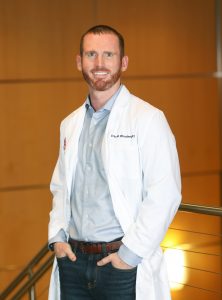Deep Brain Stimulation
Wellness Series
Speakers: Sudeshna Bose, MD and Eric Rhoden, PT, DPT
Wellness Series Summary – Deep Brain Stimulation Q&A
Speakers: Sudeshna Bose, MD and Eric Rhoden, PT, DPT
What is Deep Brain Stimulation (DBS)?
- Surgical option for the treatment of Parkinson’s disease that works like a pacemaker for the brain
- Most effectively treats tremor but can also treat rigidity and bradykinesia especially in the periphery
- Not effective at treating midline symptoms such as posture, balance, speech, swallowing, and constipation
What occurs during DBS surgery?
- Leads are placed into the brain either unilaterally or bilaterally
- The voltage is revved up during surgery and you may be asked to speak or perform movements with your hands to make sure there are no side effects
What type of preparation is needed for DBS?
- On/off testing
- Good candidates perform ~30% better with testing during on state versus off state
- Those who respond well to medication typically respond well to DBS
- Can also help determine appropriate location for placement and what kind of improvement may be expected
- Neuropsychology/cognitive testing
- Meeting with surgeon
What takes place after the surgery?
- Usually requires an overnight stay
- Battery is typically placed 1-2 weeks later
- Approximately 1-3 weeks later, a screening is performed to determine which contacts should be stimulated for optimal programming
- Programming can take days to weeks to months as the brain heals
- Some programming appointments allow you to come in on your “on” state, but most ask you to come in on your “off” state
Where is the battery placed?
- The battery is most commonly placed over the chest
- It can also be placed in the abdomen
How and when is the battery replaced?
- Surgical procedure that occurs every 4-6 years
- Battery cannot guarantee voltage as it gets low and you may see symptoms return
When should someone consider DBS as a treatment option?
- If you are a good candidate, DBS is recommended earlier rather than later for the most benefit
What are the possible negative side effects?
- Can negatively affect cognition and speech (especially when done bilaterally)
- Unrealistic expectations leading to disappointment
Why would DBS be performed bilaterally instead of unilaterally?
- If PD symptoms are on both sides of the body, DBS is typically performed bilaterally
- If PD symptoms are only on one side of the body, DBS is typically performed unilaterally
- If PD symptoms are on both sides but minor on one side, it may be performed unilaterally
What percentage of people with DBS cannot tolerate it or need to have it removed?
- If there is an infection, then the DBS needs to be removed
- If the stimulation is causing side effects rather than helping, DBS may be turned off
If there is an infection and the DBS is removed, can you have it reinstalled at a later date?
- DBS can be reinstalled, but it will need to be placed in a different tract after the infection has cleared.
Does insurance cover DBS?
Can I stop taking my PD medications with DBS?
- Medication can usually be reduced by 30-50% with DBS but will not eliminate PD medications
How often does programming occur and why?
- Every 3-6 months on average
- Due to disease progression
- To check the battery life
- Improve current programming
Can I adjust my own programming?
- You may be allowed to adjust your programming within certain parameters
- Some clinics do not allow any adjustments
- You may have different groups of programming to target different symptoms
- A group for tremor control and another group for walking
More Wellness Series
Vision and Parkinsons Disease Parkinson’s Disease affects the visual system as a whole and causes double vision, blurry vision, eye spasms, and dry eyes. We will explore how these visual changes manifest and affect daily life; as well as how Neuro-Optometric Rehabilitation and prism lenses can lessen these symptoms.Speaker: Tanya Polec, O.D., FNORA, FCOVD Date:…
Read MoreRestorative Yoga for Parkinson’s PWR! Wellness Series Speaker: Sarah Rice, PTA, RYT 200 March 15, 2023 4:30 – 6:00PM (AZ time) Relaxation is just as important as activity. Without rest, our body does not have an opportunity to regenerate and restore. Restorative Yoga provides healing for the body and mind. Sarah Rice, PTA, will provide…
Read MoreCaring for Care Partners PWR! Wellness Series February 15, 20234:30-6:00 pm (AZ time)PWR!Gym and ZoomThis event will be recorded About The Webinar Becoming a care partner for your loved one can be a significant life transition. As a care partner, you are essential in providing love, support, resiliency, companionship, and so much more to your…
Read MoreWellness Series and Holiday Wrap-Up 2022 In the month of December, we will not be hosting a virtual wellness series. We have gathered together a wrap-up for the end of the year and some fun holiday events you may be interested in. Have a happy holiday! Our list of 2022 wellness series with recordings available:…
Read MoreSpeakers

Eric Rhoden, PT, DPT
Dr. Eric Rhoden, PT, received his Bachelor of Science from California State University San Marcos and his Doctorate of Physical Therapy from Loma Linda University in Loma Linda, California. Eric is a certified PWR (Parkinson’s Wellness Recovery) therapist and prior LSVT BIG certified. He has specialized in the movement disorder population since 2014. He has a fitness and orthopedic background, which he has fused with his passion and knowledge for the movement disorder population to create comprehensive and individualized treatments. Dr. Rhoden educates patients on the relationship of nutrition and systemic body function. He is one of the primary deep brain stimulation programmers at Neurology Solutions Consultants for the past 5 years. He brings a unique perspective to the deep brain stimulation programming and utilized individualized assessment tools to maximize benefit.
Dr. Rhoden is married with an 8 year old son. In his free time, he enjoys serving at his church, coaching his sons sport teams, cooking, outdoor activities, and competing in fitness competitions.

Sudeshna Bose, MD
Dr. Bose is a movement disorder specialist with over 20 years of experience in the medical field. She is also an Assistant Professor of Neurology at the University of Arizona, where she completed her residency and fellowship. Her clinical interests are in Parkinson's disease, movement disorders and ion channels.
